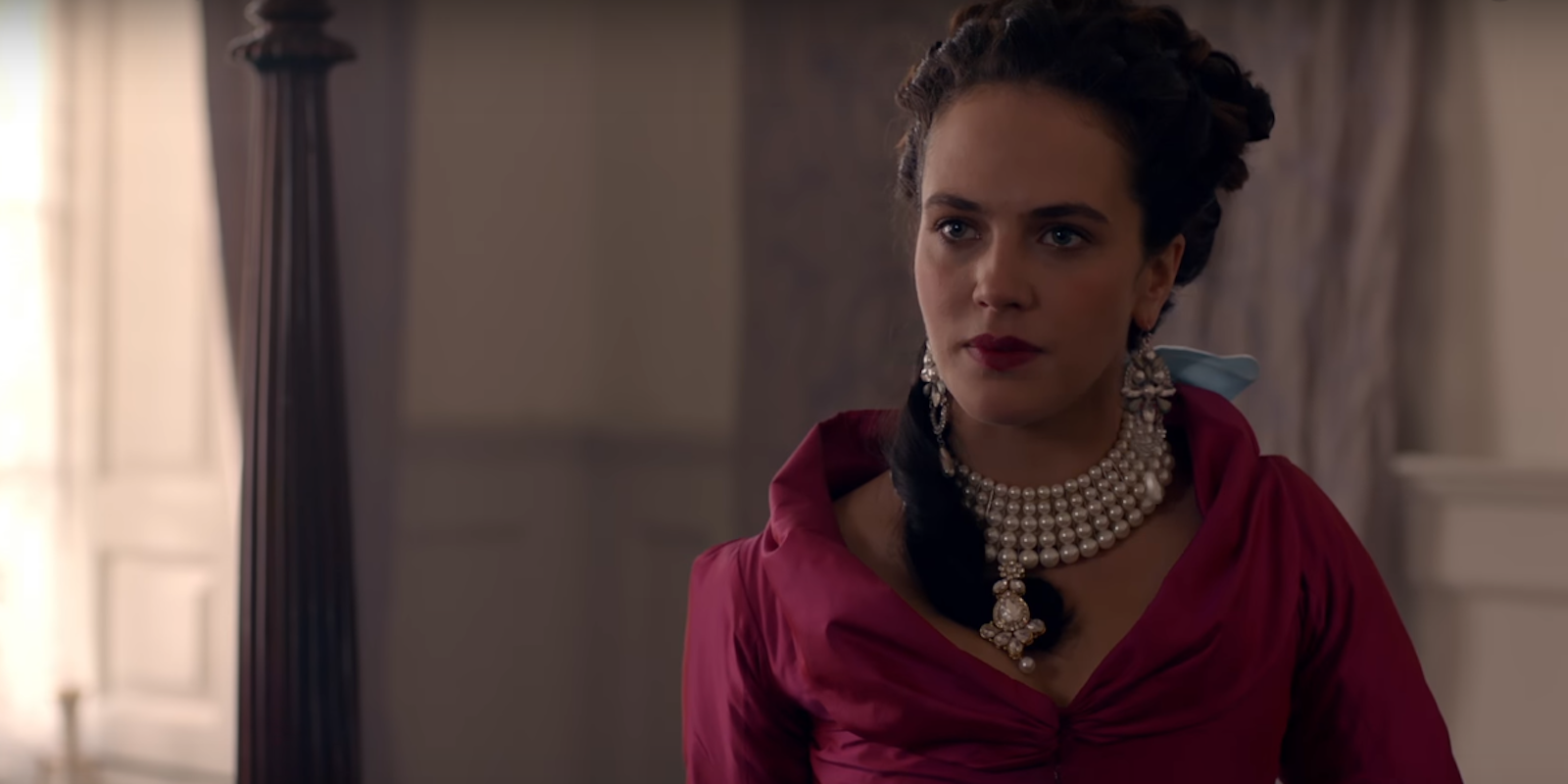Like a too-tight corset, Hulu’s Harlots rips off the subtle classicism of British TV as usual. It’s like a breath of fresh air.
Period pieces are generally for rich people. Downton Abbey, the popular soap opera about landed gentry in post-Edwardian Britain, deals with the idle rich—the kinds of people whose title and status afford them a great deal of free time. Another Period, the brilliant Comedy Central spoof, points out that the Crawleys wouldn’t be familiar with the concept of a “weekend,” because everyday is like Saturday night when you’re healthy, wealthy, and white.
But Harlots, starring Samantha Morton (Minority Report) as the madam of a brothel in 18th century London, is like Sofia Coppola meets Misfits. Produced by Moira Buffini (Jane Eyre) and Alison Newman (Footballers’ Wives), it doesn’t have a rosy-eyed view of the past. Whereas the Britain of films like Atonement and The Duchess is so stately it may as well be a wax statue, the Old Smoke in Harlots is gritty and punk-chic—marrying a lip-gloss aesthetic to a modern soundtrack.
London remains unspeakably gorgeous, but it feels invitingly lived in. You could roam around in Harlots without being worried you’ll get something on the carpets.
https://www.youtube.com/watch?v=JmUP1idcOhU
Morton, who made her name on lo-fi indies like Morvern Callar, plays against type as Margaret Wells, a bawdy force of nature struggling to keep her family and business together. Wells is arrested and her house seized after she is targeted by a rival madam, Lydia Quigley (a deliciously cunning Lesley Manville), running a high-end establishment. In Lydia’s brothel, the workers dress like Versailles debutantes and are instructed to speak French to their clients.
If that offers just the faintest hint of commentary on other programs in Harlots’ genre, Wells harbors few illusions about her place in society; the show is jarringly realistic about what it means to be a woman of her own means prior to the advent of Sheryl Sandberg. When Margaret is fined 100 pounds for indecency, she must earn back the money or jeopardize the savings that would allow her brothel to reopen at a new location. To keep her mother’s business alive, her youngest daughter, Lucy (Eloise Smyth), auctions off her virginity to the highest bidder. The deflowering is brutal without being exploitative; the reality of being female in pre-Victorian England is desperate enough without going full Game of Thrones.
There’s a refreshing lack of male gaziness to the sex in Harlots. Rather than showcasing female bodies for audience pleasure, the intercourse depicted is about money and the transaction of power.
When Margaret’s courtesan daughter, Charlotte (Jessica Brown Findlay), entertains a favorite male customer (Hugh Skinner), he urges her to sign a contract with him. She would become his “kept woman.” Charlotte, a quiet romantic, doesn’t want to sign her freedom to a man who gifts her a pineapple. Upon meeting Charlotte for intercourse, her suitor unwraps the unusual present, claiming that she is like Eve—a female embodiment of the forbidden fruit—and he is the serpent. It’s not exactly swoon-worthy. (Note: Should one feel the need to give one’s beloved a fruit as a token of affection, Emily Post would recommend a pear instead.)
Aside from an overeager male prostitute (Rory Fleck Byrne) with an eye for Charlotte, the men of Harlots are leches and leeches. Sex worker rights advocates might object to Johns portrayed in such a unilaterally unflattering light: If there were nothing objectionable about prostitution, why would all the men who turn to Margaret’s girls for pleasure be so thoroughly disreputable? Harlots, though, isn’t critiquing the sex industry (which it appears to take a neutral stance on) as much as it is toxic masculinity. These are men who need to control women as an affirmation of their self-worth and male ego.
There’s a great scene that hammers this home. One of the Johns, unable to get it up with his hired lady, blames his inability to perform on her lack of sexual appeal. He claims that the young woman is frigid. Nonetheless, the man pays her anyway—on the condition that she tell everyone how great he was in the sack. The John instructs her to say it was “like a night at the opera,” and he’s not talking about the Marx Brothers.
Even aside from feminist considerations, what makes Harlots worth sticking around for is that it’s great fun. Morton is a particular revelation. After breaking out as a mute laundress in Woody Allen’s Sweet and Lowdown two decades ago, the actress has been typecast as characters who speak in a Malickian whisper, if they talk at all. In the great Minority Report, Morton played a bald psychic struggling to readjust from years in suspended animation. Her ghostly presence, conveying a timorous, otherworldly awe, must say what she cannot. That she remains one of her generation’s most distinctive icons despite the fact that she’s barely gotten to say two sentences on-screen is a testament to Morton’s singular, oddball talent.
It’s actively difficult to believe that Morton is only 39. Her Margaret—lewd, garish, and riotously matter-of-fact—conveys a hard-earned wisdom beyond the actress’ years. Morton is looser and more alive than she ever has been on-screen, and it’s as if she’s finally being able to display the full range of her powers. There’s an exchange where Margaret and her powder-faced rival exchange insults in the company of high society that I could watch every minute of, every day. Harlots, one of this year’s most unexpected delights, feels just as liberated as its lead.


